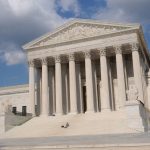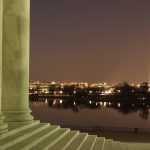 This is the first in a series of posts summarizing CPIP’s 2016 Fall Conference, “Intellectual Property & Global Prosperity.“ The conference was held at Antonin Scalia Law School, George Mason University on October 6-7, 2016. Videos of the conference panels and keynote address, as well as other materials, are available on the conference website. Read more
This is the first in a series of posts summarizing CPIP’s 2016 Fall Conference, “Intellectual Property & Global Prosperity.“ The conference was held at Antonin Scalia Law School, George Mason University on October 6-7, 2016. Videos of the conference panels and keynote address, as well as other materials, are available on the conference website. Read more
Category: Innovation
CPIP, USPTO, & Lemelson Center Host “Great Inventors” Panel Discussion at American History Museum

On February 16, 2017, CPIP hosted a panel discussion, America as a Place of Innovation: Great Inventors and the Patent System, at the Smithsonian National Museum of American History in Washington, D.C. The event was co-hosted by the Lemelson Center for the Study of Invention and Innovation at the Smithsonian Institution and the United States Patent and Trademark Office (USPTO). Read more
Federal Circuit Improperly Extends Abstract Idea Exception to Industrial Machines
 An oil well drilling rig is not an abstract idea. A method of operating an oil well drilling rig is also not an abstract idea. This proposition should be clear to all, but in TDE Petroleum Data Solutions v AKM Enterprise, the Federal Circuit held that a method of operating an oil well drilling rig is directed to the abstract idea of “storing data, receiving data, and using mathematics or a computer to organize that data and generate additional information.” Read more
An oil well drilling rig is not an abstract idea. A method of operating an oil well drilling rig is also not an abstract idea. This proposition should be clear to all, but in TDE Petroleum Data Solutions v AKM Enterprise, the Federal Circuit held that a method of operating an oil well drilling rig is directed to the abstract idea of “storing data, receiving data, and using mathematics or a computer to organize that data and generate additional information.” Read more
New CPIP Report: The Global Patent Pendency Problem
 Why are some of the biggest fights about patent policy almost pointless in some places? Because in many countries, including some of the world’s most important emerging economies, it takes so long to get patents that the rights have little meaning. Read more
Why are some of the biggest fights about patent policy almost pointless in some places? Because in many countries, including some of the world’s most important emerging economies, it takes so long to get patents that the rights have little meaning. Read more
Supreme Court Should Not Reward Efficient Infringement in Apple v. Samsung
 In Apple v. Samsung, the Supreme Court is presented with a classic issue of statutory interpretation in the case that has come to exemplify the Smart Phone Wars. In one of the many lawsuits brought by Apple against Samsung after Samsung rejected Apple’s offer to license its patents, a jury found Samsung liable for infringing Apple’s design patents on the iPhone. Read more
In Apple v. Samsung, the Supreme Court is presented with a classic issue of statutory interpretation in the case that has come to exemplify the Smart Phone Wars. In one of the many lawsuits brought by Apple against Samsung after Samsung rejected Apple’s offer to license its patents, a jury found Samsung liable for infringing Apple’s design patents on the iPhone. Read more
Federal Circuit Again Finds Computer-Implemented Invention Patent Eligible
 In Tuesday’s McRO v. Bandai decision, the Federal Circuit has once again reversed a district court’s determination that a computer-implemented invention (aka “software patent”) was not patent eligible under Section 101 of the Patent Act. This continues the Federal Circuit’s recent trend of clarifying the Supreme Court’s two-step patent-eligibility test under Mayo and Alice. Read more
In Tuesday’s McRO v. Bandai decision, the Federal Circuit has once again reversed a district court’s determination that a computer-implemented invention (aka “software patent”) was not patent eligible under Section 101 of the Patent Act. This continues the Federal Circuit’s recent trend of clarifying the Supreme Court’s two-step patent-eligibility test under Mayo and Alice. Read more
The European Union Extends Copyright in Design—and Critics Balk (Yet Again)
 The European Union recently decided to support the productive labors of designers by extending legal protections of their works in all areas of copyright, design, and patent law. Just as past legislation in the United States extending copyright terms was attacked with histrionic allegations that this was merely rent-seeking behavior by politically powerful corporations, the EU’s extension of protections for designs have come under similar attack. Read more
The European Union recently decided to support the productive labors of designers by extending legal protections of their works in all areas of copyright, design, and patent law. Just as past legislation in the United States extending copyright terms was attacked with histrionic allegations that this was merely rent-seeking behavior by politically powerful corporations, the EU’s extension of protections for designs have come under similar attack. Read more
Law Professors & Economists Urge Caution on VENUE Act in Letter to Congress
Today, 28 law professors, economists, and political scientists from across the nation submitted a letter to Congress expressing serious concerns about the recent push for sweeping changes to patent litigation venue rules, such as those proposed in the VENUE Act. The letter is copied below, and it can be downloaded here: http://ssrn.com/abstract=2816062 Read more
CPIP Scholars File Amicus Brief in Trading Technologies v. CQG
 Earlier this month, CPIP Senior Scholar Adam Mossoff penned an amicus brief in Trading Technologies v. CQG, currently on appeal to the Federal Circuit. The brief was joined by nine other IP scholars, including CPIP Senior Scholars Mark Schultz and Kristen Osenga. Read more
Earlier this month, CPIP Senior Scholar Adam Mossoff penned an amicus brief in Trading Technologies v. CQG, currently on appeal to the Federal Circuit. The brief was joined by nine other IP scholars, including CPIP Senior Scholars Mark Schultz and Kristen Osenga. Read more

 Last week, a group of law professors wrote a
Last week, a group of law professors wrote a